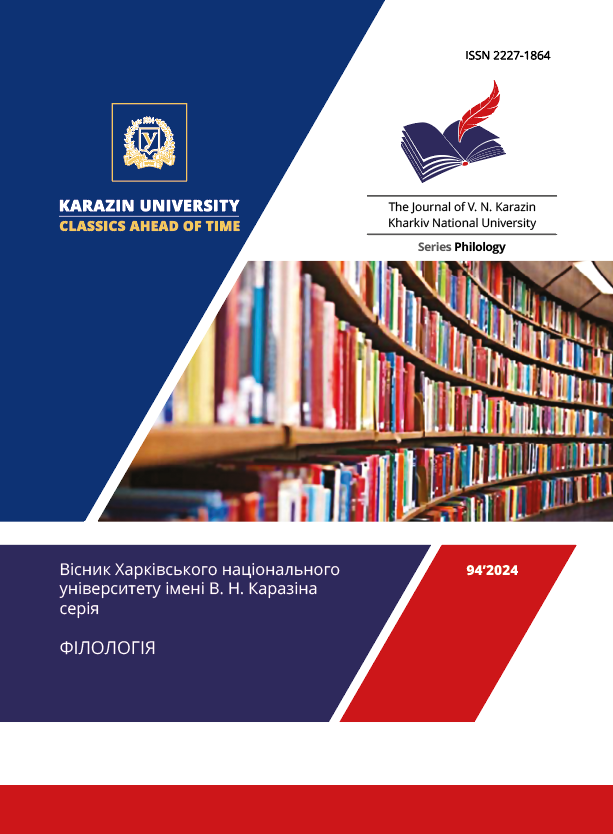Verbalization of the concept of “hearing” in Slavic languages
Abstract
The purpose of this study is to identify the most productive cognitive-nominative models that form the core of the nominative field of the concept “hearing” in Slavic languages. The object of the study is the Slavic names of auditory perception. The subject of the study is the onomasiological structure of these names.
As a result of the research, it was established that the nomination models, according to which the concept of “hearing” is verbalized in Slavic languages, are few. Modern Slavic nominations of auditory perception belong to the all-Slavic vocabulary and have Proto-Indo-European roots.
The main Slavic name for the ability to hear – слух – is a verbal formation that implements the nominative model: ‘action’ > ‘ability to perform an action’. The semantic development of this lexeme (‘voice’ > ‘ability to hear’), the etymological connection of the lexemes слух, слава and слово, the combination of the meanings of ‘speak’ and ‘hear’ in the semantics of the Proto-Slavic verb *slūti indicate that this root in the Proto-Slavic language, the ability to perceive not just sounds, but the sounds of human speech was first noted.
From another Slavic verb denoting auditory sensations – чути – the abstract name of auditory perception was not formed in Slavic languages, which seems to be connected with the semantic syncretism of the ascending verb, which can be used in relation to different perceptual modes (touch, smell, hearing, etc.) or act as an undifferentiated designation of sensation.
When using the lexeme ухо in the sense of ‘hearing’, the model is implemented: ‘an organ performing a certain function’ > ‘function’, but this model is not productive in Slavic languages (recorded only in Russian). Since for the lexeme ухо the meaning ‘ability to perceive’ is not characteristic, in Slavic languages there are no names of deafness formed according to the model: ‘absence of an organ performing a function’ > ‘absence of a function’ (in contrast to the names of blindness, for which this model is productive).
From the onomasiological point of view, it is possible to ascertain the presence of two main cognitive features that influence the nature of the verbalization of the concept of “hearing” in Slavic languages: first, the obvious initial connection of auditory perception with human speech activity (the conceptualization of the human ability to hear was formed in connection connected with the development of articulate speech), and secondly, the semantic syncretism of perceptive vocabulary, which is based on the interaction of different perceptual modes of a person (the phenomenon of synesthesia).
Downloads
References
Apresyan, Yu. D. (1995) The image of a person according to language data: an attempt at a systemic description. Questions of linguistics. No. 1, pp. 37–67. [in Russian].
Vendina, T. I. (1998) Russian language picture of the world through the prism of word formation (macrocosm). Moscow: Indrik. 240 p. [in Russian].
Gaydayenko, I. V. The semantic basis of the concept of “hearing” in the works of M. Kotsyubinsky. Scientific journal of the National Pedagogical University named after M.P. Drahomanova. Series 10. Problems of grammar and lexicology of the Ukrainian language. Vol. 4. 2008 p. 399‒404 4. Dal, V.I. (1989 – 1991) Explanatory dictionary of the living Great Russian language: In 4 volumes. Moscow. [in Russian].
Addition to the Experience of the Regional Great Russian Dictionary (1858). St. Petersburg. [in Russian].
Etymological dictionary of Ukrainian language: In 7 volumes (1982–2012) / Ed. O. S. Melnichuk. Kiev: Naukova Dumka. [in Ukrainian].
Kopitina, A. S. (2021) Linguocognitive and sociolingual parameters of the lexical-semantic field “space” (based on the materials of English, Russian, Ukrainian and French languages). dis. for free St. Doctor of Philosophy of special 035 Philology. Kiev. [in Ukrainian].
Kubryakova, E. S. (2003) Language picture of the world as a special way of representing the image of the world in human consciousness. Bulletin of the Chuvash State Pedagogical University named after I.Ya. Yakovleva., No. 4 (38), pp. 336–337. [in Russian].
New explanatory dictionary of synonyms (2003) / Ed. Yu. D. Apresyan. Moscow. [in Russian].
Ozhegov, S.I. Dictionary of the Russian language. Moscow, 1981. [in Russian].
Experience of the regional Great Russian dictionary. St. Petersburg, 1852. [in Russian].
Ostapchuk, Y. V. Verbalization and semantically based memory of the concept // Vcheni zapiski TNU named after V. I. Vernadsky. Series: Philology. Social communications Vol. 31 (70) No. 2 Part 1 2020, pp. 129–134. [in Ukrainian].
Dictionary of Russian folk dialects. (1965–2021) V. 1 – 52. St. Petersburg. [in Russian].
Dictionary of modern Russian literary language: In 20 volumes. T. 1. Moscow, 1991. [in Russian].
Dictionary of Ukrainian language. Available at: https://slovnyk.ua/ [in Ukrainian].
Sreznevsky, I. I. (1912) Materials for the dictionary of the Old Russian language based on written monuments. T. 3. Moscow. [in Russian].
Fasmer, M. Etymological dictionary of the Russian language: In 4 volumes. Moscow, 2004. [in Russian].
Tsyganenko, G. P. (1989) Etymological dictionary of the Russian language. Kyiv. [in Russian].
Etymological dictionary of Slavic languages. Proto-Slavic Lexical Fund (1965–2021)/ Ed. HE. Trubachev. Vol. 1– 42. Moscow. [in Russian].
Yavorskaya, G. M. (2009) Sound and body (on the issue of linguistic conceptualization of physical sensations). Studia Linguistica. Vol. 3, pp. 355–362. [in Russian].




